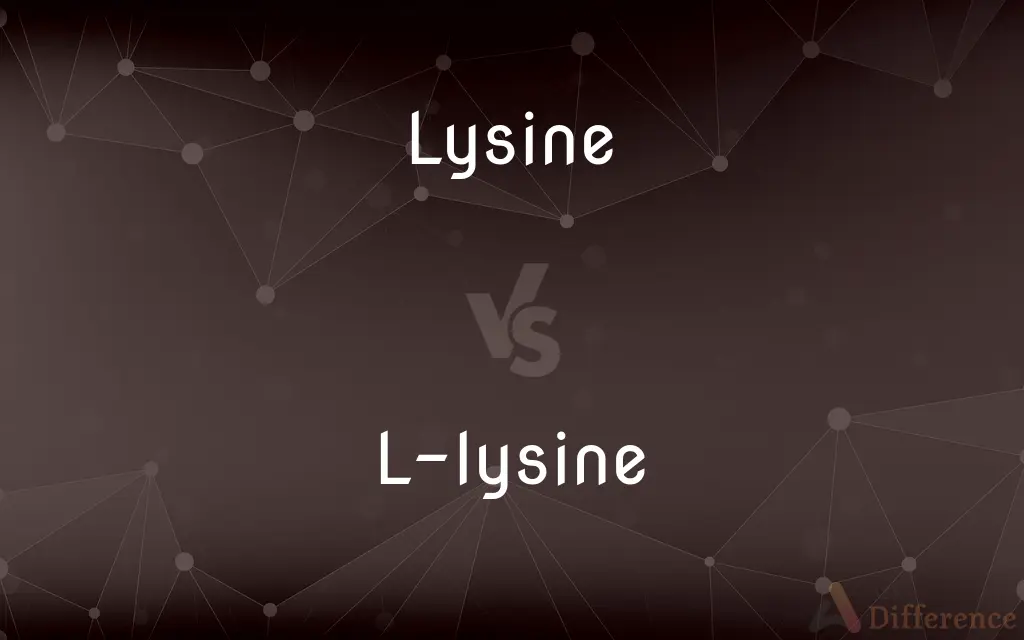Lysine vs. L-lysine — What's the Difference?
By Tayyaba Rehman — Published on November 24, 2023
Lysine is an essential amino acid crucial for human health. L-Lysine is biologically active, natural isomer form of lysine.

Difference Between Lysine and L-lysine
Table of Contents
ADVERTISEMENT
Key Differences
Lysine represents one of the nine essential amino acids that the human body cannot synthesize independently. On the other hand, L-lysine refers explicitly to the biologically active form of lysine, highlighting the specific isomer utilized in human metabolism. Both are vital in discussions of nutrition and metabolic processes, with the generic term lysine often used to implicitly refer to L-lysine due to its prevalence in biological contexts.
Within the realm of nutritional supplements and dietary discussions, Lysine is a frequently mentioned term. L-lysine is what is typically present in foods and supplements because our bodies can readily use and absorb this form. Though it might seem like the terms can be used interchangeably, specifying L-lysine underscores a scientific precision, identifying the specific enantiomer utilized in living organisms.
In scientific literature, particularly that which pertains to chemistry and stereochemistry, the distinction becomes pronounced. Lysine could refer to the amino acid without attention to its optical activity, while L-lysine asserts an attention to its stereochemistry, addressing the particular isomer involved. Hence, any study or product intended for biological interaction, such as dietary supplements, would likely specify L-lysine to affirm its biological relevance and activity.
Lysine is integral for numerous biological functions, including protein synthesis, enzyme catalysis, and nutrient absorption. However, L-lysine, while identical in molecular formula, differs in spatial arrangement, a difference crucial for its biological utility. The L-form of lysine is adept at integrating into protein structures and engaging in metabolic pathways, underscoring its indispensable role in human physiology.
The universal presence of L-lysine in discussions and materials pertaining to human health and nutrition establishes it as a default reference when lysine is discussed in similar contexts. However, this does not undermine the importance of recognizing L-lysine’s distinct configurational structure. In summary, lysine encompasses a broader categorical reference, while L-lysine is a precise, stereochemically-defined term.
ADVERTISEMENT
Comparison Chart
Stereochemistry
Non-specific
Specific L-isomer
Biological Activity
Not specified
Biologically active
Common Usage
General, broader contexts
Specific, scientific, and nutritional contexts
Presence in Supplements
Implicitly refers to L-lysine
Explicitly mentioned
Structural Orientation
No orientation specified
Specific spatial orientation
Compare with Definitions
Lysine
Integral to human health.
Lysine must be obtained through diet or supplements.
L-lysine
The biologically active form of lysine.
L-lysine is often included in dietary supplements.
Lysine
An essential amino acid.
Lysine is crucial for building proteins in the body.
L-lysine
Present in foods and supplements.
You can obtain L-lysine through various protein-rich foods.
Lysine
A building block for enzymes.
Lysine plays a vital role in enzymatic structures and functions.
L-lysine
Utilized in human metabolism.
L-lysine is essential for metabolic pathways and protein creation.
Lysine
A nutrient requiring dietary intake.
Beans and meats are good dietary sources of lysine.
L-lysine
Specific isomer of lysine.
L-lysine is utilized in human metabolic processes.
Lysine
Involved in protein synthesis.
Adequate lysine is pivotal for optimal muscle repair.
L-lysine
An optically active lysine isomer.
The optical activity of L-lysine is vital for its biological function.
Lysine
An essential amino acid, C6H14N2O2, obtained by the hydrolysis of proteins and required by the body for optimum growth.
Lysine
(amino acid) An essential amino acid, C6H14N2O2.
Lysine
An essential amino acid found in proteins; occurs especially in gelatin and casein
Common Curiosities
Why is lysine essential?
Lysine is critical for protein synthesis, enzyme function, and nutrient absorption.
What is lysine?
Lysine is an essential amino acid necessary for human health and various biological functions.
How does L-lysine differ?
L-lysine specifically refers to the biologically active isomer of lysine.
Why specify the “L” in L-lysine?
It indicates the specific, biologically active isomer of lysine utilized in human metabolism.
Is lysine available in food?
Yes, lysine is present in various foods like meat, fish, and legumes.
Do supplements typically contain L-lysine?
Yes, dietary supplements usually contain the biologically active L-lysine isomer.
Can I take L-lysine as a supplement?
Yes, L-lysine is available as a supplement and is often taken for various health reasons.
What foods are high in L-lysine?
Foods like poultry, fish, dairy, and certain plants like soybeans are high in L-lysine.
Are lysine and L-lysine different structurally?
Yes, L-lysine refers to a specific spatial arrangement of the lysine molecule.
Should I refer to L-lysine in nutritional contexts?
Often yes, as L-lysine is the biologically active form present in foods and supplements.
Is lysine needed daily?
Yes, as an essential amino acid, lysine should be a part of your daily diet.
Can I synthesize L-lysine internally?
No, lysine must be obtained through dietary sources or supplements.
Does lysine help with calcium absorption?
Yes, lysine plays a role in the absorption of calcium in the body.
Why is lysine important for bodybuilders?
Lysine assists in muscle repair and protein synthesis, crucial for bodybuilders.
Is L-lysine crucial for overall health?
Yes, as an essential amino acid, L-lysine is pivotal for various biological functions and overall health.
Share Your Discovery

Previous Comparison
Zinc Gluconate vs. Zinc Sulfate
Next Comparison
S Orbital vs. P OrbitalAuthor Spotlight
Written by
Tayyaba RehmanTayyaba Rehman is a distinguished writer, currently serving as a primary contributor to askdifference.com. As a researcher in semantics and etymology, Tayyaba's passion for the complexity of languages and their distinctions has found a perfect home on the platform. Tayyaba delves into the intricacies of language, distinguishing between commonly confused words and phrases, thereby providing clarity for readers worldwide.











































